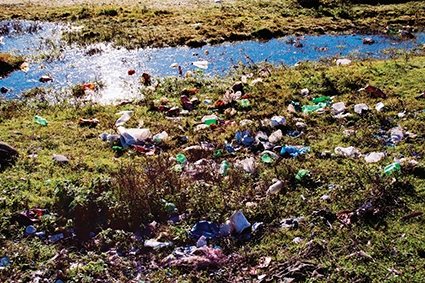Fines for Littering on the Up
With the new Waste Management Code in action imposing responsibility on various structures to fine citizens for illegal dumping, Georgia has gradually started to reduce the impact of waste on the environment. With a total of 12,915 fines handed out, the state budget saw 1.3 million GEL in the period from January 2015 to January 2016.
Before parliament ratified the new code, the country had no unified document regulating the waste management sector, and problems within it. Penalties were present in the Administrative Code, but were very fragmented and didn’t include penalties that would apply in all cases, or with all types of waste. So the new code not only established penalties, but also imposed obligations to companies, the government, local municipalities, and citizens.
According to Neli Korkotadze, the Chief Environmental Inspector at the Environmental Supervision Inspectorate, introducing the new code is a good way for the country to think about a proper waste management system, which includes not only municipal waste but also hazardous, solid, and medical waste to name a few. “More importantly, everything is written out in time in order for the country to approximate to international regulations. The code is fully based on EU regulations and has imposed sanctions on certain violations,” continued Korkotadze.
In the sanctions section of the code, the Environmental Supervision Inspectorate (ESI) under the Ministry of Environment and Natural Resources Protection, Patrol Policy under the Ministry of Internal Affairs, and local municipalities were given responsibility and authority for imposing penalties. The three institutions have the right to fine various organizations and individuals for any actions that violate the code. As Korkotadze notes, the enactment of the code has seen impressive results over the year, however, the problem still exists, with various areas remaining covered with waste.
According to statistics from the ESI, the year 2015-2016 saw a dramatic rise in the number of fines, from 258 cases in 2014-2015 to 671. While the Patrol Police was not eligible to impose such fines before the Waste Management Code, since it was introduced, the majority of fines have been written by them, totalling 12,244 cases of littering from cars on the highway. As Korkotadze explained, both activities were due to the new code, as it forced the institutions to act.
In the municipalities, there is a more complicated picture. Most municipalities have illegal dumpsites due to a lack of municipal waste collection services, either now or in the past. As the code obligated the municipalities to act on closing those illegal dumpsites, the local authorities have begun working in this direction, and have purchased equipment to provide services to areas which were not previously covered.
A USAID funded program Waste Management Technologies in the Regions (WMTR), which is implemented by the International City/Country Management Association (ICMA) and the Caucasus Environmental NGO Network (CENN), requested statistics of its two targeted regions – Kakheti and Adjara A.R. When asked how their systems worked, most of the municipalities in the regions stated that they either have no-one to monitor illegal dumping, or they do not have information on registered violations. However, it must be noted that Kobuleti, Batumi, and Telavi municipalities are very active in monitoring and imposing fines if necessary. For instance, in the period of January 2015 - February 2016, Telavi Municipality wrote fines that totalled 1,100 GEL, while Batumi Municipality received 6,750 GEL from fines.
According to the code, a person who dumps less than 2 kg of waste is fined 80 GEL, from a building- 100 GEL and from a car- 120 GEL. For 2 kg or more, the fine is 150 GEL, or for a legal entity, 500 GEL.
“Fines do have some effect and are efficient up to a point. People realize that if they are fined once they will be fined for repeated offenses. This is similar for enterprises, and for those who have an EIA (Environmental Impact Assessment), the fines are quite high,” explains Korkotadze. She estimates that the number of fines will continue to increase for another year or year and a half, while municipalities and companies create more organized waste management systems. She notes that the imposition of fines is directly proportional to the reduction of pollution to the environment. “The purpose of the fine is exactly this – to force people to think and act differently,” she says, adding that there are very rare cases of repeated violations from a previously fined person or company.
She notes that the problem her inspection faces most often is collecting proof. “If the inspector didn’t see the violation right at the moment, it becomes hard to find appropriate evidence. Of course there is witness testimony, but it still needs to be backed up,” she explained, adding that the second problem is awareness among the population, who do not realize the impact of throwing a bottle on the ground, for instance.
“Another problem that we initially faced but have managed to overcome was that fines from the inspector were sent to court, which prolonged the process. From now on, we will have a similar system to the patrol police: on-the-spot fines. Additionally, we plan on collaborating with customs offices at the borders in order to put some informational banners in various languages indicating that throwing garbage in nature is fined by law,” stated Korkotadze.
The next probable step for governmental institutions is to strengthen enforcement mechanisms and the capacity of local municipal authorities in order to fully enact the Waste Management Code. Even though fines are not a perfect method for changing habits, it is a proven method, along with raising awareness, especially at the early stage. Therefore, the government, together with local and international organizations, should actively and aggressively work on campaigns raising awareness in order to make the population understand that dumping waste whenever they desire is dreadful for the environment, their long-term health, and costs money for the government to clean and protect the area.
Baia Dzagnidze












